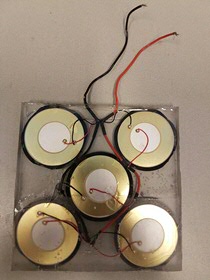Piezo testing ground in Zuidhorn generates energy
This afternoon, the University of Groningen started using a piezo testing ground at the Stationspark (station park) in Zuidhorn. Piezo electricity is energy that is generated by vibration. Director of CogniGron Prof. Beatriz Noheda and alderman Hielke Westra of the municipality of Westerkwartier revealed a temporary information panel. This panel explains the test setup for computer technology and is part of the Energy Path that is located in the station area of Zuidhorn. The experimental garden is part of the University of Groningen CogniGron research programme in the field of neuromorphic systems: the base for a new generation of computers.
The CogniGron researchers are developing new smart materials that can be used in computer systems inspired by our brain. These materials only require a fraction of the energy that computers currently use. An important part of this is the piezoelectric effect. At the set-up in Zuidhorn there is a tile that produces an electrical voltage under the influence of pressure, for example by standing on it. By walking over this tile, energy can be generated. At the same time, the piezo tiles can also be used as a sensor. The Zuidhorn station area is an ideal location to try out this technique. The piezo tile was designed and made by Assistant Professor Mónica I. Acuautla Meneses of the Engineering and Technology Institute Groningen (ENTEG).

New generation of computers
Specifically, the research can contribute to the development of a new type of computer based on how your brain works. The new generation of computers that CogniGron is working on will not be purely digital like the current microelectronics. Prof. Beatriz Noheda: “We look at the neurons and synapses in our brain. They calculate with all sorts of different values that depend on the input they receive from their neighbors; adaptive neuromorphic materials that can learn. The interconnectivity of the elements, in other words the network in those new materials, is therefore very important. The input can make them more sensitive or insensitive, just like the nerve cells in the brain. With these new computers, the traditional separation between computer memory and the central processing unit disappears - which in principle makes them faster and more (energy) efficient.”
Testing in practice
Alderman Westra: “The energy consumption of your brain is around 20 watts. That would be a nice answer to the energy needs of our information society where the amount of data produced is growing explosively. A separate power station is already needed to provide data centers in the Netherlands with electricity. If we can reduce the energy requirement of information and communication technology in the long term by cooperating in this research, we are happy to do so. The University of Groningen was looking for a place where the findings from the laboratory can be tested in practice. Because piezo technology is used, they looked for a place with a lot of vibrations. Our station area fits in well with that. Moreover, we can also show the public what science is doing.”.
| Last modified: | 14 February 2020 3.52 p.m. |
More news
-
21 November 2024
Dutch Research Agenda funding for research to improve climate policy
Michele Cucuzzella and Ming Cao are partners in the research programme ‘Behavioural Insights for Climate Policy’
-
13 November 2024
Can we live on our planet without destroying it?
How much land, water, and other resources does our lifestyle require? And how can we adapt this lifestyle to stay within the limits of what the Earth can give?
-
13 November 2024
Emergentie-onderzoek in de kosmologie ontvangt NWA-ORC-subsidie
Emergentie in de kosmologie - Het doel van het onderzoek is oa te begrijpen hoe ruimte, tijd, zwaartekracht en het universum uit bijna niets lijken te ontstaan. Meer informatie hierover in het nieuwsbericht.
